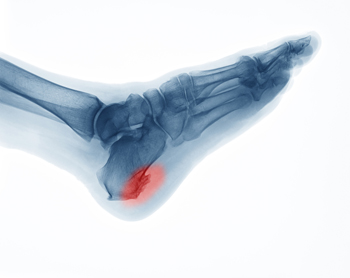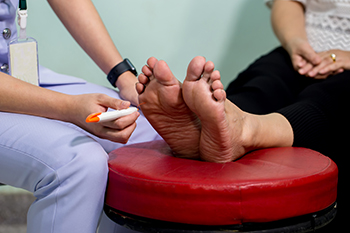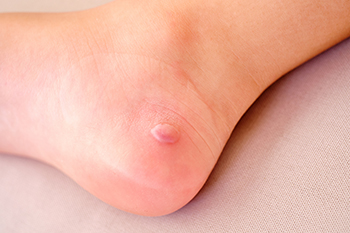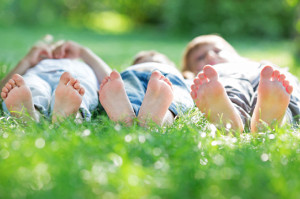Yakima
(509) 225-3668
Ellensburg
(509) 925-4633
 A heel spur, medically known as a calcaneal spur, is a bony growth that develops on the underside of the heel bone. This condition often results from long-term strain on the foot muscles and ligaments, commonly associated with repetitive activities such as running or jumping. Over time, this strain leads to the accumulation of calcium deposits, forming the bony protrusion. Heel spurs are frequently linked to plantar fasciitis, an inflammation of the plantar fascia tissue that runs along the bottom of the foot. Factors contributing to heel spur development include wearing ill-fitting shoes, excessive weight, and having flat feet or high arches. If you have heel pain, it may be indicative of a heel spur, and it is suggested that you consult a podiatrist who can accurately diagnose and offer a comprehensive treatment plan for heel spurs.
A heel spur, medically known as a calcaneal spur, is a bony growth that develops on the underside of the heel bone. This condition often results from long-term strain on the foot muscles and ligaments, commonly associated with repetitive activities such as running or jumping. Over time, this strain leads to the accumulation of calcium deposits, forming the bony protrusion. Heel spurs are frequently linked to plantar fasciitis, an inflammation of the plantar fascia tissue that runs along the bottom of the foot. Factors contributing to heel spur development include wearing ill-fitting shoes, excessive weight, and having flat feet or high arches. If you have heel pain, it may be indicative of a heel spur, and it is suggested that you consult a podiatrist who can accurately diagnose and offer a comprehensive treatment plan for heel spurs.
Heel spurs can be incredibly painful and sometimes may make you unable to participate in physical activities. To get medical care for your heel spurs, contact one of our podiatrists from Cascade Foot & Ankle. Our doctors will do everything possible to treat your condition.
Heels Spurs
Heel spurs are formed by calcium deposits on the back of the foot where the heel is. This can also be caused by small fragments of bone breaking off one section of the foot, attaching onto the back of the foot. Heel spurs can also be bone growth on the back of the foot and may grow in the direction of the arch of the foot.
Older individuals usually suffer from heel spurs and pain sometimes intensifies with age. One of the main condition's spurs are related to is plantar fasciitis.
Pain
The pain associated with spurs is often because of weight placed on the feet. When someone is walking, their entire weight is concentrated on the feet. Bone spurs then have the tendency to affect other bones and tissues around the foot. As the pain continues, the feet will become tender and sensitive over time.
Treatments
There are many ways to treat heel spurs. If one is suffering from heel spurs in conjunction with pain, there are several methods for healing. Medication, surgery, and herbal care are some options.
If you have any questions feel free to contact our offices located in Yakima and Ellensburg, WA . We offer the latest in diagnostic and treatment technology to meet your needs.
 Taking care of your feet is essential for preserving your ability to walk and stay active. The feet, complex structures with 26 bones, numerous muscles, ligaments, and tendons, support your entire body. Neglecting foot health can lead to common problems like blisters, calluses, bunions, and more serious conditions such as plantar fasciitis or arthritis. Good foot health is vital for maintaining mobility and proper posture. Healthy feet allow for an active lifestyle, which is vital for overall well-being. At different ages, foot care needs vary. For children, it is about ensuring proper growth and development. For adults, it is about maintaining strength and flexibility. For seniors, preventing falls and managing chronic conditions becomes essential. Daily foot care should include washing and drying feet thoroughly, moisturizing to prevent dryness, trimming nails properly, and wearing appropriate footwear. Regular self-checks can catch issues early. If you would like to learn more about everyday foot care, it is suggested that you schedule an appointment with a podiatrist who can address specific problems and educate you on comprehensive foot care.
Taking care of your feet is essential for preserving your ability to walk and stay active. The feet, complex structures with 26 bones, numerous muscles, ligaments, and tendons, support your entire body. Neglecting foot health can lead to common problems like blisters, calluses, bunions, and more serious conditions such as plantar fasciitis or arthritis. Good foot health is vital for maintaining mobility and proper posture. Healthy feet allow for an active lifestyle, which is vital for overall well-being. At different ages, foot care needs vary. For children, it is about ensuring proper growth and development. For adults, it is about maintaining strength and flexibility. For seniors, preventing falls and managing chronic conditions becomes essential. Daily foot care should include washing and drying feet thoroughly, moisturizing to prevent dryness, trimming nails properly, and wearing appropriate footwear. Regular self-checks can catch issues early. If you would like to learn more about everyday foot care, it is suggested that you schedule an appointment with a podiatrist who can address specific problems and educate you on comprehensive foot care.
Everyday foot care is very important to prevent infection and other foot ailments. If you need your feet checked, contact one of our podiatrists from Cascade Foot & Ankle. Our doctors can provide the care you need to keep you pain-free and on your feet.
Everyday Foot Care
Often, people take care of their bodies, face and hair more so than they do for their feet. But the feet are a very important aspect of our bodies, and one that we should pay more attention to. Without our feet, we would not be able to perform most daily tasks.
It is best to check your feet regularly to make sure there are no new bruises or cuts that you may not have noticed before. For dry feet, moisturizer can easily be a remedy and can be applied as often as necessary to the affected areas. Wearing shoes that fit well can also help you maintain good foot health, as well as making it easier to walk and do daily activities without the stress or pain of ill-fitting shoes, high heels, or even flip flops. Wearing clean socks with closed shoes is important to ensure that sweat and bacteria do not accumulate within the shoe. Clean socks help to prevent Athlete’s foot, fungi problems, bad odors, and can absorb sweat.
If you have any questions please feel free to contact our offices located in Yakima and Ellensburg, WA . We offer the newest diagnostic and treatment technologies for all your foot and ankle needs.

Diabetic peripheral neuropathy is a common issue for individuals with type 2 diabetes, with nearly half experiencing this complication. This condition arises when prolonged high blood sugar levels cause damage to the nerves, especially in the feet and lower legs. Symptoms of peripheral neuropathy include numbness, tingling, burning sensations, and muscle weakness, which can progressively disrupt daily activities. A significant concern is “diabetic foot,” where the loss of feeling and poor blood flow can lead to ulcers, infections, and in severe cases loss of limb. Diabetic neuropathy also can increase the risk of falls and fractures due to lack of sensation in the feet, impaired balance and reduced coordination. Factors such as smoking, high blood pressure, obesity, and cholesterol issues can further increase the risk of developing this diabetic peripheral neuropathy. Early detection and proper management are of extreme importance. If you notice unusual sensations in your feet or lower legs, especially persistent numbness or pain, it is suggested that you make an appointment with a podiatrist who can conduct a thorough examination and recommend a personalized treatment plan.
Neuropathy
Neuropathy can be a potentially serious condition, especially if it is left undiagnosed. If you have any concerns that you may be experiencing nerve loss in your feet, consult with one of our podiatrists from Cascade Foot & Ankle. Our doctors will assess your condition and provide you with quality foot and ankle treatment for neuropathy.
What Is Neuropathy?
Neuropathy is a condition that leads to damage to the nerves in the body. Peripheral neuropathy, or neuropathy that affects your peripheral nervous system, usually occurs in the feet. Neuropathy can be triggered by a number of different causes. Such causes include diabetes, infections, cancers, disorders, and toxic substances.
Symptoms of Neuropathy Include:
Those with diabetes are at serious risk due to being unable to feel an ulcer on their feet. Diabetics usually also suffer from poor blood circulation. This can lead to the wound not healing, infections occurring, and the limb may have to be amputated.
Treatment
To treat neuropathy in the foot, podiatrists will first diagnose the cause of the neuropathy. Figuring out the underlying cause of the neuropathy will allow the podiatrist to prescribe the best treatment, whether it be caused by diabetes, toxic substance exposure, infection, etc. If the nerve has not died, then it’s possible that sensation may be able to return to the foot.
Pain medication may be issued for pain. Electrical nerve stimulation can be used to stimulate nerves. If the neuropathy is caused from pressure on the nerves, then surgery may be necessary.
If you have any questions, please feel free to contact our offices located in Yakima and Ellensburg, WA . We offer the newest diagnostic and treatment technologies for all your foot care needs.

Preventing sock blisters involves considering several key factors. Choosing the right sock material is vital, as synthetic blends or merino wool are excellent options because they wick moisture away from the skin and reduce friction. Cotton socks, on the other hand, tend to retain moisture, increasing the risk of blisters. Ensuring the correct sock size is also essential. Socks that are too tight can cause pressure points, while those that are too loose can create folds that rub against the skin. Additionally, the construction of the sock matters, as seamless socks or those with flat seams minimize irritation. Padded socks can provide extra cushioning and protection in high-friction areas. Paying attention to these details can significantly reduce the likelihood of developing painful sock blisters during activities. If you have developed blisters that have become infected, and would like to know if the socks or shoes are causing them, it is suggested that you consult a podiatrist who can offer correct treatment and prevention strategies.
Blisters are prone to making everyday activities extremely uncomfortable. If your feet are hurting, contact one of our podiatrists of Cascade Foot & Ankle. Our doctors can provide the care you need to keep you pain-free and on your feet.
Foot Blisters
Foot blisters develop as a result of constantly wearing tight or ill-fitting footwear. This happens due to the constant rubbing from the shoe, which can often lead to pain.
What Are Foot Blisters?
A foot blister is a small fluid-filled pocket that forms on the upper-most layer of the skin. Blisters are filled with clear fluid and can lead to blood drainage or pus if the area becomes infected.
How Do Blisters Form?
Blisters on the feet are often the result of constant friction of skin and material, usually by shoe rubbing. Walking in sandals, boots, or shoes that don’t fit properly for long periods of time can result in a blister. Having consistent foot moisture and humidity can easily lead to blister formation.
Prevention & Treatment
It is important to properly care for the affected area in order to prevent infection and ease the pain. Do not lance the blister and use a Band-Aid to provide pain relief. Also, be sure to keep your feet dry and wear proper fitting shoes. If you see blood or pus in a blister, seek assistance from a podiatrist.
If you have any questions, please feel free to contact our offices located in Yakima and Ellensburg, WA . We offer the newest diagnostic and treatment technologies for all your foot care needs.
 Good foot health is important, particularly for children, as their feet are still developing and are foundational to their overall physical health. Children’s feet grow rapidly, and proper development is essential to prevent long-term issues. Poor foot health in childhood can lead to problems such as flat feet, misaligned bones, or even postural issues affecting the knees, hips, and spine. Ensuring good foot health involves several key practices. Children should wear properly fitted shoes that provide adequate support. Regularly checking shoe size is important as kids outgrow shoes quickly. Encourage children to walk barefoot when safe, as this can strengthen their foot muscles. Hygiene is equally important, as keeping feet clean and dry prevents fungal infections. Observing children’s walking patterns and foot structure can help identify issues early. For any concerns about your child's foot health, it is suggested that you visit a podiatrist for professional advice and treatment.
Good foot health is important, particularly for children, as their feet are still developing and are foundational to their overall physical health. Children’s feet grow rapidly, and proper development is essential to prevent long-term issues. Poor foot health in childhood can lead to problems such as flat feet, misaligned bones, or even postural issues affecting the knees, hips, and spine. Ensuring good foot health involves several key practices. Children should wear properly fitted shoes that provide adequate support. Regularly checking shoe size is important as kids outgrow shoes quickly. Encourage children to walk barefoot when safe, as this can strengthen their foot muscles. Hygiene is equally important, as keeping feet clean and dry prevents fungal infections. Observing children’s walking patterns and foot structure can help identify issues early. For any concerns about your child's foot health, it is suggested that you visit a podiatrist for professional advice and treatment.
Making sure that your children maintain good foot health is very important as they grow. If you have any questions, contact one of our podiatrists of Cascade Foot & Ankle. Our doctors can provide the care you need to keep you pain-free and on your feet.
Keeping Children's Feet Healthy
Having healthy feet during childhood can help prevent medical problems later in life, namely in the back and legs. As children grow, their feet require different types of care. Here are some things to consider...
Although babies do not walk yet, it is still very important to take care of their feet.
Avoid putting tight shoes or socks on his or her feet.
Allow the baby to stretch and kick his or her feet to feel comfortable.
As a toddler, kids are now on the move and begin to develop differently. At this age, toddlers are getting a feel for walking, so don’t be alarmed if your toddler is unsteady or ‘walks funny’.
As your child gets older, it is important to teach them how to take care of their feet.
Show them proper hygiene to prevent infections such as fungus.
Be watchful for any pain or injury.
Have all injuries checked by a doctor as soon as possible.
Comfortable, protective shoes should always be worn, especially at play.
If you have any questions please feel free to contact our offices located in Yakima and Ellensburg, WA . We offer the newest diagnostic and treatment technologies for all your foot and ankle needs.